
MC Escher Balcony 1945

You don’t have to own bitcoin anymore to bet on it.
• Bitcoin Futures Top $18,000, Soar 20% From Open – Halted for Second Time (ZH)
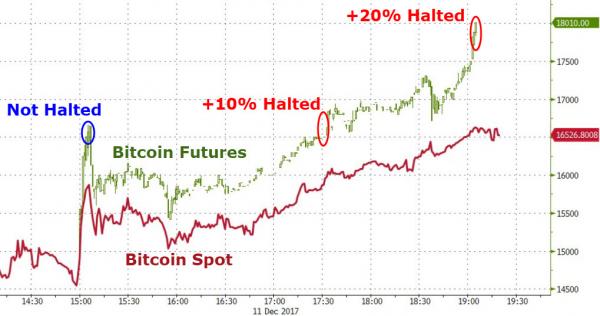
Update: At 10:05pm ET, the CFE halted trading in Cboe Bitcoin Futures (XBT), in accordance with CFE Rule 1302(i)(ii) which defines the threshold for the halt as a 20% surge. XBT will re-open for trading approximately five (5)minutes from the time of the halt. Bitcoin Futures have topped $18,000 for the first time… It was reopened at 10:10pm ET. All of which is odd because Bob Pisani and the rest of the mainstream said that the opening of Bitcoin Futures would bring about the demise of the cryptocurrency due to the ability to short?
Update: At precisely 8:31pm ET, the CBOE instituted the first ever XBT trading halt, which lasted for two minutes according to a notice on Cboe’s website. XBT contracts have since resumed trading. As a reminder, the Cboe can halt trading for 2 minutes after 10% swings, and 5 minutes at 20%, an attempt to prevent wild swings.

Things are a-changing.
• Investors Told to Brace for Steepest Rate Hikes Since 2006 (BBG)
Wall Street economists are telling investors to brace for the biggest tightening of monetary policy in more than a decade. With the world economy heading into its strongest period since 2011, Citigroup Inc. and JPMorgan Chase & Co. predict average interest rates across advanced economies will climb to at least 1 percent next year in what would be the largest increase since 2006. As for the quantitative easing that marks its 10th anniversary in the U.S. next year, Bloomberg Economics predicts net asset purchases by the main central banks will fall to a monthly $18 billion at the end of 2018, from $126 billion in September, and turn negative during the first half of 2019. That reflects an increasingly synchronized global expansion finally strong enough to spur inflation, albeit modestly.
The test for policy makers, including incoming Federal Reserve Chair Jerome Powell, will be whether they can continue pulling back without derailing demand or rocking asset markets. “2018 is the year when we have true tightening,” said Ebrahim Rahbari, director of global economics at Citigroup in New York. “We will continue on the current path where financial markets can deal quite well with monetary policy but perhaps later in the year, or in 2019, monetary policy will become one of the complicating factors.” A clearer picture should form this week when the Norges Bank, Fed, Bank of England, European Central Bank and Swiss National Bank announce their final policy decisions of 2017. They collectively set borrowing costs for more than a third of the world economy. At least 10 other central banks also deliver decisions this week.
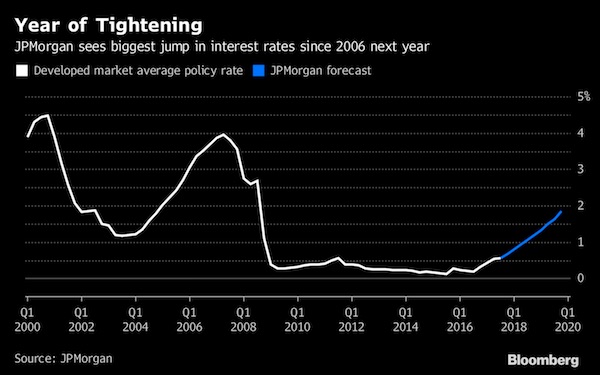

Again, from an article with much more info and many more graphs.
• The Struggle To Maintain The “Standard Of Living” (Roberts)
Economic cycles are only sustainable for as long as excesses are being built. The natural law of reversions, while they can be suspended by artificial interventions, cannot be repealed. More importantly, while there is currently “no sign of recession,” what is going on with the main driver of economic growth – the consumer? The chart below shows the real problem. Since the financial crisis, the average American has not seen much of a recovery. Wages have remained stagnant, real employment has been subdued and the actual cost of living (when accounting for insurance, college, and taxes) has risen rather sharply. The net effect has been a struggle to maintain the current standard of living which can be seen by the surge in credit as a percentage of the economy.
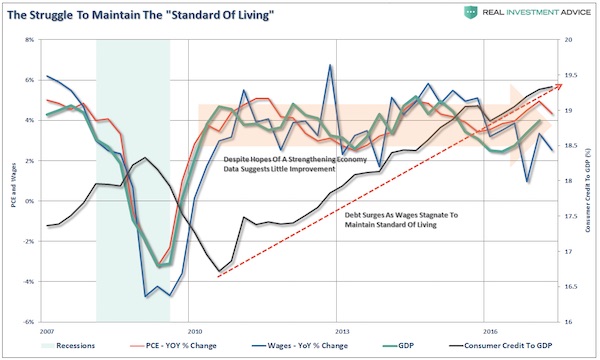
To put this into perspective, we can look back throughout history and see that substantial increases in consumer debt to GDP have occurred coincident with recessionary drags in the economy. No sign of recession? Are you sure about that?
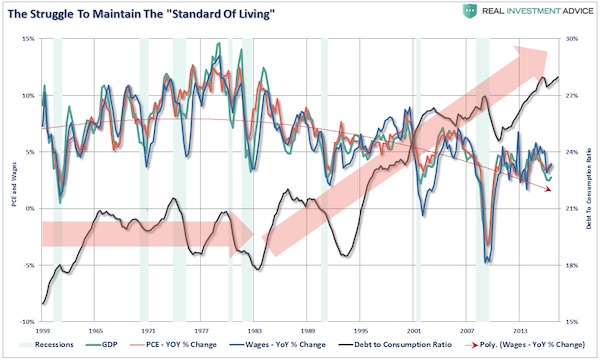
There has been a shift caused by the financial crisis, aging demographics, massive monetary interventions and the structural change in employment which has skewed the seasonal-adjustments in economic data. This makes every report from employment, retail sales, and manufacturing appear more robust than they would be otherwise. This is a problem mainstream analysis continues to overlook but will be used as an excuse when it reverses. Here is my point. While the call of a “recession” may seem far-fetched based on today’s economic data points, no one was calling for a recession in early 2000 or 2007 either. By the time the data is adjusted, and the eventual recession is revealed, it won’t matter as the damage will have already been done. As Howard Marks once quipped: “Being right, but early in the call, is the same as being wrong.”

You need an audit for that?
• China Audit Finds Provinces Faked Data and Borrowed Illegally (BBG)
China found some local governments inflated revenue levels and raised debt illegally in a nationwide audit, a setback for Beijing in its bid to boost the credibility of economic data after a run of scandals. Ten cities, counties or districts in the Yunnan, Hunan and Jilin provinces, as well as the southwestern city of Chongqing, inflated fiscal revenues by 1.55 billion yuan ($234 million), the National Audit Office said in a statement on its website dated Dec. 8. Of that, 1.24 billion yuan was from the Wangcheng district in the provincial capital of Hunan, where officials faked the ownership transfer of local government buildings to boost income. The inspection, which covered the third quarter, also found that five cities or counties in the Jiangxi, Shaanxi, Gansu, Hunan and Hainan provinces raised about 6.43 billion yuan in debts by violating rules, such as offering commitment letters.
The findings are a blow to China’s bid to rein in data fraud, which has been widespread in some of the poorer provinces where officials were incentivized to inflate the numbers as a way of advancing their careers. Concern from investors wanting to be able to trust data out of the world’s second-largest economy led to the government trying to crack down on the practice, with President Xi Jinping saying in March that data fraud “must be throttled,” according to the state-run Xinhua News Agency. Rigid stability in provincial data on growth and employment has long sparked questions from economists, with the rust-belt province of Liaoning, in China’s northeast, famously admitting back in January that it had fabricated fiscal data from 2011 to 2014. Some regions and cities in Jilin province and Inner Mongolia also falsified reports, the Communist Party said in June, without providing details.

“Near the highs, few opportunities exist to earn substantial returns, so you should take little risk..”
• Markets Tell You What To Do If You Listen (Peters)
Anecdote” “What are the odds we come across an opportunity in the coming 4yrs to earn 20%?” the investor asked his team. “High,” they answered. “The odds are 100%,” he said, having seen this movie a few times. “So our cost of capital is 5% per year (20% divided by 4yrs), plus the 1% we earn on cash,” he said. His team nodded. “Under no circumstances should we deploy capital unless it earns well more than 6% per year from here on out.” It made sense. “What do we see that earns more than this hurdle?” he asked. His team’s list was as short today as it was long in 2016, 2011, 2009, 2003, 1998, 1997, 1994, 1992, 1990, 1987, etc. Today’s few opportunities have much in common with previous peaks: negative convexity, complexity, illiquidity, leverage, and/or all the above. “Investors confuse a 7.5% average annualized return target with a 7.5% annual return target,” he explained. “They’re entirely different things.”
Targeting average annualized returns allows you to accept what the market gives you, while targeting annual returns forces you to leverage investments near peak valuations to hit your bogey. “Typical pension and endowment boards want incoming investment returns to consistently exceed outgoing flows.” So most investors attempt to produce the highest return every year, no matter what it takes. “But that’s the wrong objective. Never underestimate the value of cash and patience in achieving the real goal; superior returns over the complete cycle,” he explained. “Markets tell you what to do if you listen,” he said. “Near the highs, few opportunities exist to earn substantial returns, so you should take little risk. Near the lows, opportunities to earn attractive returns are abundant.” You should take a lot of risk. “This sounds simple because it is. It’s obvious. But obvious is not easy.”

But Canada says no.
• UK Seeking ‘Canada Plus Plus Plus’ EU Trade Deal (BBG)
Britain wants a trade deal with the European Union that includes the best parts of the bloc’s agreements with Japan, Canada and South Korea, along with financial services, Brexit Secretary David Davis said, showing optimism a pact can be struck within a year. The chances of the U.K. leaving the EU without a deal, defaulting to World Trade Organization rules, have “dropped dramatically,’’ Davis said in a BBC TV interview on Sunday. Still, he signaled the painstaking agreement struck on Friday to end the first phase of Brexit negotiations isn’t binding, and that Britain’s exit payment of as much as 39 billion pounds ($52 billion) is contingent on reaching a free-trade agreement. Doing so, he said, “is not that complicated.”
“We start in full alignment: we start in complete convergence with the EU, so we then work it out from there,” Davis said on the Andrew Marr Show. “What we want is a bespoke outcome: We’ll probably start with the best of Canada, the best of Japan and the best of South Korea and then add to that the bits that are missing, which is services,” he said. “Canada plus plus plus would be one way of putting it.” The Brexit secretary’s bullishness belies the noise coming from his counterparts in the EU. It’s taken eight months of at times bitter haggling to make sufficient progress on what was supposed to be the easiest part of the talks – resolving Britain’s exit payment, its future border with Ireland, and the rights of EU and U.K. citizens living in each other’s territories.

Don’t think I ever heard clapped-out before.
• Brexit’s Just A Distraction To The Real Problem: UK’s Clapped-Out Economy (G.)
As Brexiteers shout “forward” and remainers chant “ back”, the battle over the EU dominates British politics. Yet it obscures a more basic British problem. Our clapped-out economy, brilliant at consumption, poor at production, is becoming unviable. A “nation of shopkeepers” has become a nation of shoppers, dependent on debt. Deindustrialisation and misguided economic policies have reduced the former workshop of the world to a level where Britain can neither pay its way, nor afford the defence and public services an advanced society needs. Everything in which we once were leaders – ships, railways, TV, great bridges, nuclear plants, bicycles, textiles, clothing, even Kit Kats – we now import.
We consume more than we produce, leading to an annual balance of payments deficit rising above 6% of GDP, financed by borrowing and selling companies, property and citizenship to survive. The result is a sluggish economy (a growing proportion of which is owned by foreigners); low productivity (because the manufacturing sector has shrunk to one-tenth of GDP); and static pay, as every sector except finance cuts costs to survive. Being in or out of the EU has little relevance to this basic problem. The EU is a market, not a mutual support system. Instead of redistributing growth to succour laggards it punishes them, as it has Greece. It drains us and proscribes the techniques of nurture by state aid, protectionism and devaluation by which Germany and France grew. Its “aid” is just our own money back, with the EU’s heavy costs taken out.
Even worse, Germany’s huge surpluses mean that deficit countries like the UK, with our £60bn-plus trade deficit, are compounded by the single market. Yet coming out offers no solution either. It generates uncertainty and deters investment. Most of world trade is controlled by multinationals, and Britain would be more vulnerable to their ministrations. Tory Brexiteers aim at turning us, down and dirty, into a low-wage, deregulated, cost-cutting tax haven-on-Thames. Hardly acceptable to an electorate that has already endured decades of that. The only solution is to rebalance an economy excessively dependent on finance and services by widening the manufacturing and production base and making it competitive. Neither free trade nor the single market will do that.

The EU is going to make this ugly. It’s the only thing they know how to do.
• Poland Risks Being the EU’s Rogue State (BBG)
Behind the noise of Brexit negotiations, the talk in the EU this year has been that there’s potentially a bigger problem in the east. And the prospect of another rupture looks to be increasing. Poland’s de facto leader, Jaroslaw Kaczynski, hand-picked his second prime minister in two years, opting last week for western-educated Finance Minister Mateusz Morawiecki as he seeks to boost the economy after revamping the judicial system. He is another Kaczynski acolyte who has backed the increasingly authoritarian Law & Justice party’s push to seize more control of the courts, a plan condemned by the European Parliament and European Commission The mood in Brussels is that EU institutions can no longer stand by and watch a country that’s the biggest net recipient of European aid thumb its nose without paying some sort of price. Few people are discussing Poland following Britain out of the bloc, but a protracted conflict is getting more likely.
Concerns about the shift in Poland triggered calls to limit access to EU funds for countries disrespecting the democratic rule of law. At a ministerial meeting on Nov. 15 in Brussels, the issue was raised during a discussion about the 2021-2028 budget by countries including Germany, France and the Nordic states, according to two EU officials with knowledge of the matter. Poland’s refusal to take in mainly Muslim refugees was referred last week to the European Court of Justice along with Hungary and the Czech Republic. “There is a growing feeling in Brussels that solidarity cannot be a one-way street, and that it becomes difficult to justify the 10 billion-euro per year net transfers for a country that is increasingly at odds with the bloc’s values,” said Bruno Dethomas, a senior policy adviser at GPLUS consultancy in Brussels and a former EU ambassador to Poland. “It is high time the EU reacted, or it risks losing its soul.”
Poles are accustomed to their government stirring up nationalist fervor with blistering attacks on the EU while welcoming the policies of U.S. President Donald Trump. It’s railed against taking in Muslim refugees, claimed the country has been enslaved and snapped at criticism of its power grab this year. But even by Kaczynski’s standards, his speech on Nov. 10 to mark Independence Day pulled no punches. It’s up to Poles to show “the sick Europe of today the path back to health, to fundamental values, to true freedom and to the strengthening of our civilization based on Christianity,” he said.

How confident are you in this audit?
• Pentagon To Undergo First Ever Audit (ZH)
After decades of waste, overpayments, trillions of missing or improperly accounted for dollars, and most recently losing track of 44,000 US soldiers, the Pentagon is about to undergo its first audit in history conducted by 2,400 auditors from independent public accounting firms to conduct reviews across the Army, Navy, Air Force and more – followed by annual audits going forward. The announcement follows a May commitment by Pentagon comptroller David Norquist, who previously served as the CFO at the Department of Homeland Security when the agency performed its audit. “Starting an audit is a matter of driving change inside a bureaucracy that may resist it,” Norquist told members of the Armed Services Committee at the time when pressed over whether or not he could get the job done at the DHS.
According to the DoD release: “The audit is massive. It will examine every aspect of the department from personnel to real property to weapons to supplies to bases. Some 2,400 auditors will fan out across the department to conduct it, Pentagon officials said. “It is important that the Congress and the American people have confidence in DoD’s management of every taxpayer dollar,” Norquist said. -defense.gov”. The Pentagon is no stranger to criticism over serious waste and purposefully sloppy accounting. A DoD Inspector General’s report from 2016 – which appears to be unavailable on the DoD website (but fortunately WAS archived)- found that in 2015 alone a staggering $6.5 trillion in funds was unaccounted for out of the Army’s budget, with $2.8 trillion in “wrongful adjustments” occurring in just one quarter.
In 2015, the Pentagon denied trying to shelve a study detailing $125 billion in waste created by a bloated employee counts for noncombat related work such as human resources, finance, health care management and property management. The report concluded that $125 billion could be saved by making those operations more efficient. On September 10th, 2001, Secretary of Defense Donald Rumsfeld announced that “According to some estimates we cannot track $2.3 trillion in transactions,” after a Pentagon whistleblower set off a probe. A day later, the September 11th attacks happened and the accounting scandal was quickly forgotten.

Dickens was a big spender how had little.
• ‘A Christmas Carol’, Money, Debt, and Success (MW)
Karl Marx was so broke in 1859 he couldn’t afford the postage stamps to mail off his new manuscript, leading the philosopher to lament, “I don’t suppose anyone has ever written about ‘money’ when so short the stuff.” He was probably right about that. However, the most famous book about money written by someone strapped for cash wasn’t “Das Kapital” or “The Communist Manifesto.” It was “A Christmas Carol.” Charles Dickens suffered not only a personal-finance crisis but a creative one, as well, in the fall of 1843, when, in a sort of literary Hail Mary pass, he committed to writing a Christmas book in an impossible six weeks. And, in a plot twist as improbable as anything he himself could have come up with, this gambit actually worked: “A Christmas Carol” became one of the best-selling and most widely adapted books of all time, a work that shaped the very meaning of the holiday itself, and singlehandedly wiped out the goose market — more on that later.
This remarkable tale, recounted in Les Standiford’s biography, “The Man Who Invented Christmas,” and just turned into a highly entertaining new movie of the same name starring Dan Stevens and Christopher Plummer, holds financial lessons for everyone, especially those of us who’ve been tormented by the ghosts of bills past due and deadlines soon to come. Dickens was in debt: to begin with. There is no doubt whatever about that. Sales of his two most recent novels were so disappointing that his publishers cut his pay. Meanwhile, the 31-year-old author and social-justice warrior had just moved into a larger, and much more expensive, home to accommodate the birth of his fifth child (like Marx, his pecuniary troubles stemmed somewhat from the age-old failure to live within one’s means).
On top of all this, his relatives, including his chronically deadbeat dad, kept hitting him up for money. His father, who later inspired the beloved character Wilkins Micawber in “David Copperfield,” was so hopeless with money that Dickens rented his parents a cottage far out in the country, where he hoped it would be harder for them to overspend. For Dickens this was all kind of galling because he had been working so hard and he didn’t have much to show for it,” said Declan Kiely, curator of a terrific ongoing exhibit on Dickens at the Morgan Library in New York. When Scrooge berates his cheerful nephew Fred, “What’s Christmas time to you but a time for paying bills without money; a time for finding yourself a year older, but not an hour richer?” that could just as well have been Dickens ranting.

How inevitable is this?
• Mass Starvation Is Humanity’s Fate (Monbiot)
[..] to keep pace with food demand, farmers in south Asia expect to use between 80 and 200% more water by the year 2050. Where will it come from? The next constraint is temperature. One study suggests that, all else being equal, with each degree celsius of warming the global yield of rice drops by 3%, wheat by 6% and maize by 7%. These predictions could be optimistic. Research published in the journal Agricultural & Environmental Letters finds that 4C of warming in the US corn belt could reduce maize yields by between 84 and 100%. The reason is that high temperatures at night disrupt the pollination process. But this describes just one component of the likely pollination crisis. Insectageddon, caused by the global deployment of scarcely tested pesticides, will account for the rest. Already, in some parts of the world, workers are now pollinating plants by hand. But that’s viable only for the most expensive crops.
[..] Because they tend to use more labour, grow a wider range of crops and work the land more carefully, small farmers, as a rule, grow more food per hectare than large ones. In the poorer regions of the world, people with fewer than five hectares own 30% of the farmland but produce 70% of the food. Since 2000, an area of fertile ground roughly twice the size of the UK has been seized by land grabbers and consolidated into large farms, generally growing crops for export rather than the food needed by the poor. While these multiple disasters unfold on land, the seas are being sieved of everything but plastic. Despite a massive increase in effort (bigger boats, bigger engines, more gear), the worldwide fish catch is declining by roughly 1% a year, as populations collapse. The global land grab is mirrored by a global sea grab: small fishers are displaced by big corporations, exporting fish to those who need it less but pay more.
About 3 billion people depend to a large extent on fish and shellfish protein. Where will it come from? All this would be hard enough. But as people’s incomes increase, their diet tends to shift from plant protein to animal protein. World meat production has quadrupled in 50 years, but global average consumption is still only half that of the UK – where we eat roughly our bodyweight in meat every year – and just over a third of the US level. Because of the way we eat, the UK’s farmland footprint (the land required to meet our demand) is 2.4 times the size of its agricultural area. If everyone aspires to this diet, how exactly do we accommodate it? The profligacy of livestock farming is astonishing. Already, 36% of the calories grown in the form of grain and pulses – and 53% of the protein – are used to feed farm animals. Two-thirds of this food is lost in conversion from plant to animal. A graph produced last week by Our World in Data suggests that, on average, you need 0.01m2 of land to produce a gram of protein from beans or peas, but 1m2 to produce it from beef cattle or sheep: a 100-fold difference.
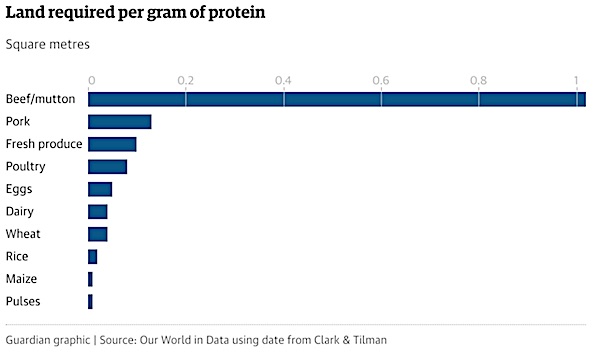

Monsanto is the no.1 risk to our food. Presented as our savior.
• Monsanto Offers Cash To US Farmers Who Use Controversial Chemical (R.)
Monsanto will give cash back to U.S. farmers who buy a weed killer that has been linked to widespread crop damage, offering an incentive to apply its product even as regulators in several U.S. states weigh restrictions on its use. The incentive to use XtendiMax with VaporGrip, a herbicide based on a chemical known as dicamba, could refund farmers over half the sticker price of the product in 2018 if they spray it on soybeans Monsanto engineered to resist the weed killer, according to company data. The United States faced an agricultural crisis this year caused by new formulations of dicamba-based herbicides, which farmers and weed experts say harmed crops because they evaporated and drifted away from where they were sprayed. Monsanto says XtendiMax is safe when properly applied.
The company is banking on the chemical and soybean seeds engineered to resist it, called Xtend, to dominate soybean production in the United States, the world’s second-largest exporter. BASF SE and DowDuPont also sell versions of dicamba-based herbicides. Monsanto’s cash-back offer comes as federal and state regulators are requiring training for farmers who plan to spray dicamba in 2018 and limiting when it can be used. Weed specialists say the restrictions make the chemical more costly and inconvenient to apply, but Monsanto’s incentive could help convince farmers to use it anyway.

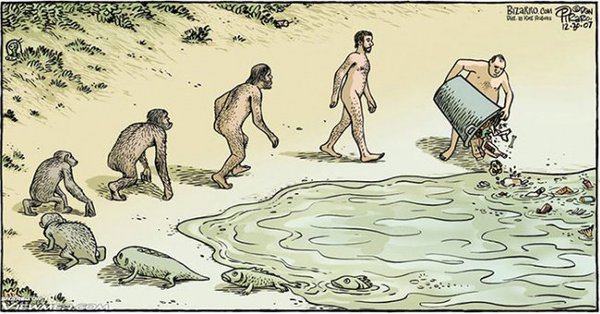









Home › Forums › Debt Rattle December 11 2017